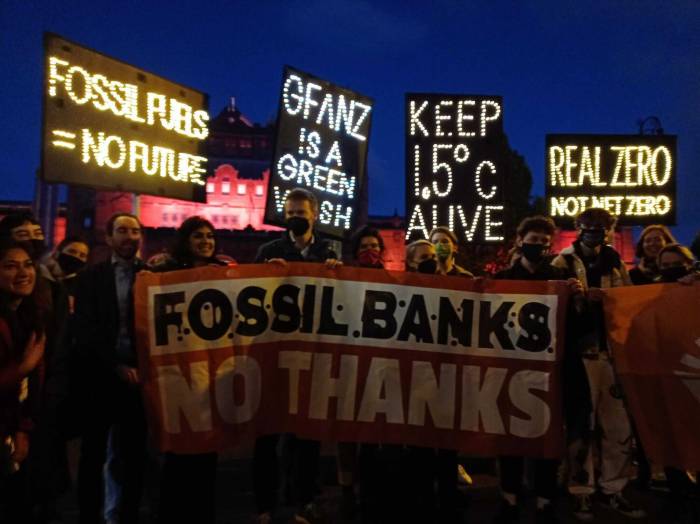As you’ll know if you follow 350.org, cutting off financial flows to the fossil fuel industry is our jam. It’s the most direct and effective way to end the era of fossil fuels – so let’s dive into the End Fossil Fuel Finance discourse being broadcast from Glasgow.
On November 3rd, private finance day at #COP26, The Glasgow Financial Alliance for Net Zero (GFANZ) announced “24 major initiatives,” calling the package “revolutionary.” They are not: these commitments are voluntary, and lean heavily on the magic hand of the free markets to do the right thing. The sentiment that if the banks, fueling the climate crisis, just had the right “tools” and “information” we would all be ok, is laughably disingenuous, never mind the fact that bankers have little idea what net zero means.
The one mandatory measure announced on the 3rd was the UK’s requirements for firms to publish Net-Zero transition plans setting out how they will decarbonize through 2050. Again, this is “good first step” material, but we are at the finish line, not the starting line. The most effective way to reverse the climate crisis is to keep coal, oil and gas in the ground now, not to ask companies to disclose net zero transition plans. And these vague plans by 2050 with no improvements needed over the next 10-20 years? No politician with a 4 year term takes such things seriously. We don’t either.
As Dr. Daniela Gabor, economics professor at the University of the West of England, Bristol, wrote, “instead of public regulation, we have private catalytic initiatives to render the climate crisis profitable for private finance, under the motto: ‘new asset classes for us, new risks for the state’.”
That’s why we are calling on the referees of the banking world to step in and make the banks do precisely what is needed, which begins with ending fossil fuel finance.
On the eve of COP26, the Bank of England threatened to “come down pretty hard” on companies failing to manage climate risk starting from 2022. We need more than empty threats. Central Bank regulators have the power to penalize banks for being overly exposed to polluting industries. One of the ways they can do that is by ordering them to hold more capital to account for the risk. And, for our part, we’ll be pushing the Central Banks in the biggest financial centers around the world to do their job; regulate and manage the end of fossil fuel finance.

Activists protest fossil finance outside COP26 in Glasgow.
Later in the day on the 3rd, this announcement hit the press, “More than 20 countries and financial institutions will halt all financing for fossil fuel development overseas.” Countries involved include the US, UK, Denmark and some developing countries that would receive such finance, including Costa Rica. Our old friends at the European Investment Bank are one of the financial institutions on board. However, China and Japan, two big funders of fossil fuel development around the world, are not participating. And to be clear, this announcement has nothing to do with the fossil fuels being extracted domestically. And doesn’t implicate the big fish; private finance.
Public development investors are signaling hard. And regulators, like Central Banks, are moving to set up better information and planning structures. But for too long, regulators and governments have trusted voluntary decarbonisation, knowing well it can’t deliver for 1.5C or even 2C. If we are truly going to meet the moment, we need governments and central banks to collectively agree to penalize dirty lending. A meaningful end to fossil fuel finance.
COP26 isn’t the last chance we have to pressure the world’s richest countries into ending fossil finance — but it’s an important time for us to demand that the trillions currently poured into fossil fuels are redirected into climate justice and a Just Transition to clean energy for all. Sign the petition here.